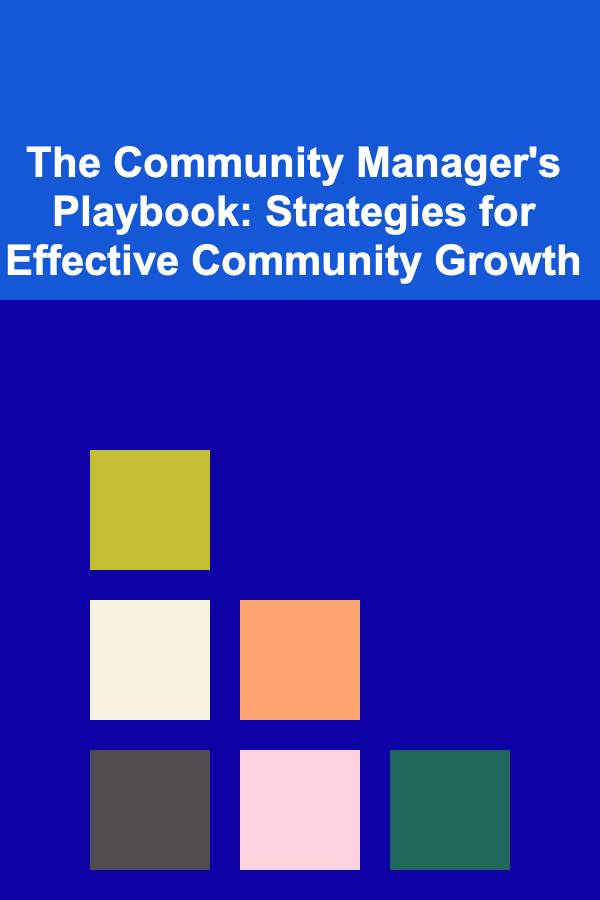
The Community Manager's Playbook: Strategies for Effective Community Growth
ebook include PDF & Audio bundle (Micro Guide)
$12.99$9.99
Limited Time Offer! Order within the next:

Community management is a powerful tool in today's digital age. A thriving community can drive engagement, loyalty, and even revenue, making it an invaluable asset for businesses, brands, and organizations. Whether you're managing an online forum, a social media group, or an interest-based community, effective community management requires a well-rounded approach. This playbook outlines actionable strategies for community managers who aim to cultivate vibrant, engaged, and sustainable communities.
Understand Your Community's Purpose and Values
Defining the Community's Core Mission
Before jumping into the logistical aspects of community management, it's crucial to understand why your community exists in the first place. What purpose does it serve? What is the ultimate goal of your community? These answers will guide your strategies and decisions. Whether you're building a community around a product, a hobby, or a cause, you need to ensure that the mission is clear to both yourself and your members.
Actionable Steps:
- Clarify the Purpose: Write a mission statement for your community. This will serve as your north star for decision-making.
- Align Community Values: Define the core values that will govern behavior and interactions. These might include inclusivity, respect, transparency, or innovation.
- Communicate the Mission: Regularly reinforce the community's mission in your communications, such as newsletters, social media posts, and welcome messages.
Fostering a Sense of Belonging
The most successful communities are those where members feel a sense of belonging and shared purpose. This can be fostered by creating an environment where everyone feels welcomed and valued.
Actionable Steps:
- Welcome New Members: Create a process for onboarding new members, introducing them to the community's purpose, guidelines, and key people.
- Encourage Personal Introductions: Allow members to introduce themselves in a way that fosters connection, such as sharing interests, goals, or challenges.
- Celebrate Milestones: Acknowledge important community milestones like anniversaries, achievements, or member contributions to reinforce the sense of community.
Build Engagement with Meaningful Content
Create Valuable and Relevant Content
Content is at the heart of community engagement. You need to develop content that resonates with your members and encourages them to interact, share, and participate. The key is providing value that aligns with the community's interests and needs.
Actionable Steps:
- Conduct Surveys: Ask your members what type of content they find valuable. This can be done through polls or informal feedback sessions.
- Diversify Content: Share a variety of content types---articles, videos, polls, Q&A sessions, etc.---to keep things fresh and interesting.
- Create Educational Content: Offering tutorials, case studies, or guides helps members learn and grow, which can significantly boost engagement.
Encourage Member-Generated Content
Members are often the most passionate about the community, and encouraging them to contribute content can enhance engagement and deepen the sense of ownership. This might include sharing experiences, creating how-to guides, or participating in discussions.
Actionable Steps:
- Launch Content Challenges: Organize challenges or campaigns that encourage members to create content---whether it's photos, videos, or written stories.
- Host Community Events: Virtual or in-person events like webinars, workshops, or live Q&As can help facilitate member interaction and content sharing.
- Reward Contributions: Recognize and celebrate members who contribute high-quality content. Rewards can range from shout-outs to exclusive privileges within the community.
Cultivate Positive Community Culture
Establish Clear Community Guidelines
A healthy community thrives on mutual respect and positive interactions. To maintain this, clear guidelines are essential. These rules should cover everything from tone and behavior to what's considered acceptable content. Having well-defined guidelines ensures consistency and helps prevent toxic behaviors from taking root.
Actionable Steps:
- Draft Clear Rules: Create a document or page outlining the do's and don'ts within the community. Be clear and specific.
- Enforce Rules Consistently: Ensure that you, or moderators, are consistently enforcing the guidelines. Inconsistent enforcement can lead to confusion and a breakdown in community trust.
- Encourage Self-Moderation: Empower members to report inappropriate behavior, and consider implementing a tiered system where users can help moderate content or enforce the rules.
Foster Open Communication and Transparency
An open and transparent communication culture builds trust and credibility with your members. It's important to keep the lines of communication open, listen to feedback, and be transparent about decisions and changes.
Actionable Steps:
- Share Updates Regularly: Keep your members informed about the latest developments, changes in guidelines, or upcoming events.
- Create Feedback Loops: Encourage members to provide feedback through surveys, forums, or regular check-ins.
- Be Honest in Your Communication: When challenges arise or mistakes happen, own up to them. Transparency, even when things go wrong, shows authenticity and builds community trust.
Manage Conflict Effectively
Conflicts are bound to arise in any community. How you handle these disputes will greatly impact the community's health. A proactive approach to conflict resolution can prevent problems from escalating and ensure that the community remains welcoming and productive.
Actionable Steps:
- Have a Clear Conflict Resolution Process: Establish a clear process for addressing conflicts, whether it's escalating to a moderator or a group discussion.
- Encourage Empathy: When disputes arise, encourage members to approach the situation with empathy and understanding.
- Intervene When Necessary: As a community manager, you should not hesitate to step in when things get out of hand. Be fair and impartial in your mediation efforts.
Encourage Long-Term Engagement and Growth
Develop a Strong Membership Program
To ensure that your community continues to thrive, you need to create a system for long-term engagement. This could include tiered membership programs, special privileges for top contributors, or rewards for long-term participation.
Actionable Steps:
- Create Membership Tiers: Implement a reward system where active members can unlock exclusive content or privileges as they contribute more to the community.
- Offer Member Discounts or Access: If applicable, provide special discounts, early access to new products, or exclusive content for community members.
- Host Member-Only Events: Offer special events or gatherings that are only accessible to members, helping them feel valued and connected to the community.
Invest in Community Advocacy
When your members feel a strong sense of belonging, they become the best advocates for your community. Empowering your community members to spread the word and bring in new members can lead to organic growth.
Actionable Steps:
- Incentivize Referrals: Create referral programs that reward members who invite others to join the community. These incentives could be in the form of exclusive content, badges, or discounts.
- Leverage Social Proof: Encourage satisfied members to share their positive experiences on social media, blogs, or testimonials.
- Recognize Community Ambassadors: Identify and highlight members who actively advocate for the community. Show appreciation for their efforts through recognition or special privileges.
Track and Analyze Engagement
To ensure sustainable community growth, you need to track your community's performance. This involves regularly analyzing key metrics and adjusting strategies as needed. The insights you gain will help you optimize your approach and maintain an active and engaged community.
Actionable Steps:
- Use Analytics Tools: Leverage tools like Google Analytics, social media insights, or community-specific platforms (like Discourse or Discord) to track engagement, growth, and activity patterns.
- Measure Member Retention: Pay attention to how long members stay in your community and how frequently they engage with content. This can provide valuable insights into the health of your community.
- Act on Feedback: Use the feedback and data you collect to make informed decisions about what changes or improvements should be made to the community.
Build a Strong Team of Moderators
Empower Moderators for Effective Management
Community managers can't do everything themselves. Building a trusted team of moderators can help manage the day-to-day activities and ensure that your community remains healthy and active. Moderators should align with the community's values and possess strong communication skills to handle various situations.
Actionable Steps:
- Define Moderator Roles: Clearly outline the roles and responsibilities of your moderators. This might include approving content, responding to member queries, or enforcing community rules.
- Provide Training: Train your moderators on the community guidelines, conflict resolution, and communication strategies. They should know how to represent the community in a positive and professional manner.
- Empower Moderators: Allow your moderators to take initiative and make decisions within their scope. Empowering them increases their sense of ownership and effectiveness.
Collaborate with External Experts
In some cases, seeking external expertise can enhance the value of your community. This could be through partnerships, guest speakers, or subject matter experts who can provide added value to your members.
Actionable Steps:
- Invite Guest Speakers: Host webinars or live sessions with industry experts or thought leaders to provide members with insights and knowledge they can't get elsewhere.
- Partner with Relevant Brands: Collaborate with brands or organizations that align with your community's mission. This could lead to co-hosted events, product giveaways, or other beneficial initiatives.
- Leverage Expert Content: Encourage guest contributors to provide valuable content, which can broaden the perspective within your community.
Conclusion
Effective community management is a long-term commitment that requires strategy, empathy, and ongoing effort. By focusing on building strong relationships, creating valuable content, fostering a positive culture, and ensuring consistent engagement, you can cultivate a thriving community that grows organically and sustains itself over time. Remember, the most successful communities are not built overnight, but with dedication and the right strategies, your community can become a powerful force for growth and engagement.
Reading More From Our Other Websites
- [Home Maintenance 101] How to Clean and Maintain Your Gutters Effectively
- [Stamp Making Tip 101] Stamp Making: Essential Tools and Materials for Beginners
- [Personal Financial Planning 101] How to Reduce Debt: Strategies for a Debt-Free Future
- [Home Holiday Decoration 101] How to Design Front Porch Christmas Decor That Welcomes the Season
- [Trail Running Tip 101] DIY Upgrades: Transforming Your Trail Running Backpack for Maximum Performance
- [Organization Tip 101] How to Create a Budget for Pet Expenses
- [Home Security 101] How to Keep Your Home Safe from Cyber Threats
- [Home Budget Decorating 101] How to Incorporate Artisans and Local Makers in Your Home
- [Home Storage Solution 101] How to Organize Your Tools in the Garage for Maximum Efficiency
- [Gardening 101] The Ecological Benefits of Replacing Lawns with Native Plant Gardens

How to Build a Checklist for Preparing Presentation Equipment and Tech
Read More
How to Build Long-Term Relationships with Small Business Clients: An Actionable Guide
Read More
How to Create a Passive Income Stream with Investments
Read More
How to Make Money Online as an Instagram Growth Expert
Read More
Mastering the Reciprocating Saw: A Demolition and Tough Cuts Guide
Read More
How to Design Social Media Graphics That Convert
Read MoreOther Products

How to Build a Checklist for Preparing Presentation Equipment and Tech
Read More
How to Build Long-Term Relationships with Small Business Clients: An Actionable Guide
Read More
How to Create a Passive Income Stream with Investments
Read More
How to Make Money Online as an Instagram Growth Expert
Read More
Mastering the Reciprocating Saw: A Demolition and Tough Cuts Guide
Read More